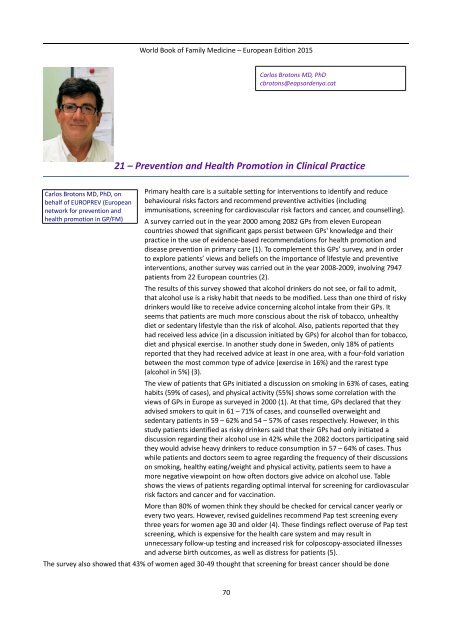Family Medicine
World Book 2015
World Book 2015
You also want an ePaper? Increase the reach of your titles
YUMPU automatically turns print PDFs into web optimized ePapers that Google loves.
World Book of <strong>Family</strong> <strong>Medicine</strong> – European Edition 2015<br />
Carlos Brotons MD, PhD<br />
cbrotons@eapsardenya.cat<br />
21 – Prevention and Health Promotion in Clinical Practice<br />
Carlos Brotons MD, PhD, on<br />
behalf of EUROPREV (European<br />
network for prevention and<br />
health promotion in GP/FM)<br />
Primary health care is a suitable setting for interventions to identify and reduce<br />
behavioural risks factors and recommend preventive activities (including<br />
immunisations, screening for cardiovascular risk factors and cancer, and counselling).<br />
A survey carried out in the year 2000 among 2082 GPs from eleven European<br />
countries showed that significant gaps persist between GPs' knowledge and their<br />
practice in the use of evidence-based recommendations for health promotion and<br />
disease prevention in primary care (1). To complement this GPs’ survey, and in order<br />
to explore patients’ views and beliefs on the importance of lifestyle and preventive<br />
interventions, another survey was carried out in the year 2008-2009, involving 7947<br />
patients from 22 European countries (2).<br />
The results of this survey showed that alcohol drinkers do not see, or fail to admit,<br />
that alcohol use is a risky habit that needs to be modified. Less than one third of risky<br />
drinkers would like to receive advice concerning alcohol intake from their GPs. It<br />
seems that patients are much more conscious about the risk of tobacco, unhealthy<br />
diet or sedentary lifestyle than the risk of alcohol. Also, patients reported that they<br />
had received less advice (in a discussion initiated by GPs) for alcohol than for tobacco,<br />
diet and physical exercise. In another study done in Sweden, only 18% of patients<br />
reported that they had received advice at least in one area, with a four-fold variation<br />
between the most common type of advice (exercise in 16%) and the rarest type<br />
(alcohol in 5%) (3).<br />
The view of patients that GPs initiated a discussion on smoking in 63% of cases, eating<br />
habits (59% of cases), and physical activity (55%) shows some correlation with the<br />
views of GPs in Europe as surveyed in 2000 (1). At that time, GPs declared that they<br />
advised smokers to quit in 61 – 71% of cases, and counselled overweight and<br />
sedentary patients in 59 – 62% and 54 – 57% of cases respectively. However, in this<br />
study patients identified as risky drinkers said that their GPs had only initiated a<br />
discussion regarding their alcohol use in 42% while the 2082 doctors participating said<br />
they would advise heavy drinkers to reduce consumption in 57 – 64% of cases. Thus<br />
while patients and doctors seem to agree regarding the frequency of their discussions<br />
on smoking, healthy eating/weight and physical activity, patients seem to have a<br />
more negative viewpoint on how often doctors give advice on alcohol use. Table<br />
shows the views of patients regarding optimal interval for screening for cardiovascular<br />
risk factors and cancer and for vaccination.<br />
More than 80% of women think they should be checked for cervical cancer yearly or<br />
every two years. However, revised guidelines recommend Pap test screening every<br />
three years for women age 30 and older (4). These findings reflect overuse of Pap test<br />
screening, which is expensive for the health care system and may result in<br />
unnecessary follow-up testing and increased risk for colposcopy-associated illnesses<br />
and adverse birth outcomes, as well as distress for patients (5).<br />
The survey also showed that 43% of women aged 30-49 thought that screening for breast cancer should be done<br />
70


